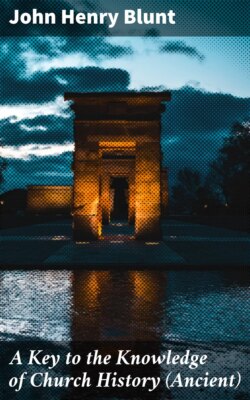Читать книгу A Key to the Knowledge of Church History (Ancient) - John Henry Blunt - Страница 8
На сайте Литреса книга снята с продажи.
Section 2. Our Lord's Work in the Foundation of the Church.
ОглавлениеTable of Contents
Our Lord prepared for the Foundation of His Church by instituting Holy Baptism and the Holy Eucharist, and by appointing the twelve Apostles.
Our Blessed Lord's Ministry was spent in making preparations for the foundation of His Church. At His first entrance on that Ministry, He "sanctified Water to the mystical washing away of sin;" at the close of it, He blessed the elements of Bread and Wine, and made them the channels of His constant Presence with His Church, "a perpetual memory of His Precious Death" before God. He also appointed human instruments, who, in His Name and by His Authority, should carry out this mighty work, and be the foundation-stones of the new spiritual building, bonded together and firmly established in Him the "Chief Corner Stone." "The wall of the City had twelve foundations, and in them the names of the twelve Apostles of the Lamb[2]."
The Apostles taught and trained by our Lord's Example and Teaching.
The Apostles were solemnly set apart by our Lord after a night of watching and prayer[3], and from that time became His constant companions, witnessing His mighty works, listening to the words of Heavenly Wisdom which fell from His Sacred Lips, and thus experiencing, under the guidance of the Head of the Church Himself, such a training as might best fit them for their superhuman labours[4]. Special instructions given them, and not understood until after the Day of Pentecost. A large portion of what is now stored up in the Holy Gospel for the instruction of the whole body of Christians, was in the first instance spoken to the Apostles with a special view to their Apostolic vocation; to them it was "given to know the Mysteries of the Kingdom of Heaven." Doubtless much of what they were thus taught remained unexplained "Mysteries" to them until the Coming of the Holy Ghost on the Day of Pentecost to "guide them into all Truth," and especially to instruct them in the real meaning of what had before seemed to be "hard sayings" in their Master's Teaching.
This Teaching continued after the Resurrection.
Again, after our Blessed Lord's Passion and Resurrection, we read that He was "seen of them forty days, speaking of the things pertaining to the Kingdom of God[5]," i.e. to the Church, the Kingdom which, by the agency of the Twelve Apostles, He was about to establish in this world. No record is left us as to what these "things" were of which He spake to them; but we cannot doubt that the Words of Divine Wisdom would remain deeply engraven on their hearts, and be a treasure of strength and counsel in the trials and perplexities of the untried path which lay before them, the Holy Spirit "bringing to their remembrance" any sayings of the Saviour which human frailty might have hindered them from remembering[6].
A commission given to the Apostles for all their official acts,
The Apostles received from the Great High Priest before His Ascension, a commission to execute the various functions of the priestly office, to baptize[7], to teach[8], to consecrate and offer the Holy Eucharist[9], and to absolve[10]; besides a general and comprehensive promise that all their official acts should be confirmed by Him, in the words, "Lo, I am with you alway, even unto the end of the world[11]." but not exerted till after Pentecost. We do not, however, find that this commission was acted on by the Apostles before the day of Pentecost; the Saviour's will was, that it should, so to speak, lie dormant until the seal of the Holy Spirit was impressed upon it. During the days of expectation which followed our Lord's Ascension, we read that the holy company who were gathered together in the "upper room," "continued with one accord in prayer and supplication[12];" but we have no mention of any celebration of the Holy Eucharist, whilst immediately after the Descent of the Holy Ghost we are told of their daily continuance in "the Breaking of the Bread[13]."
